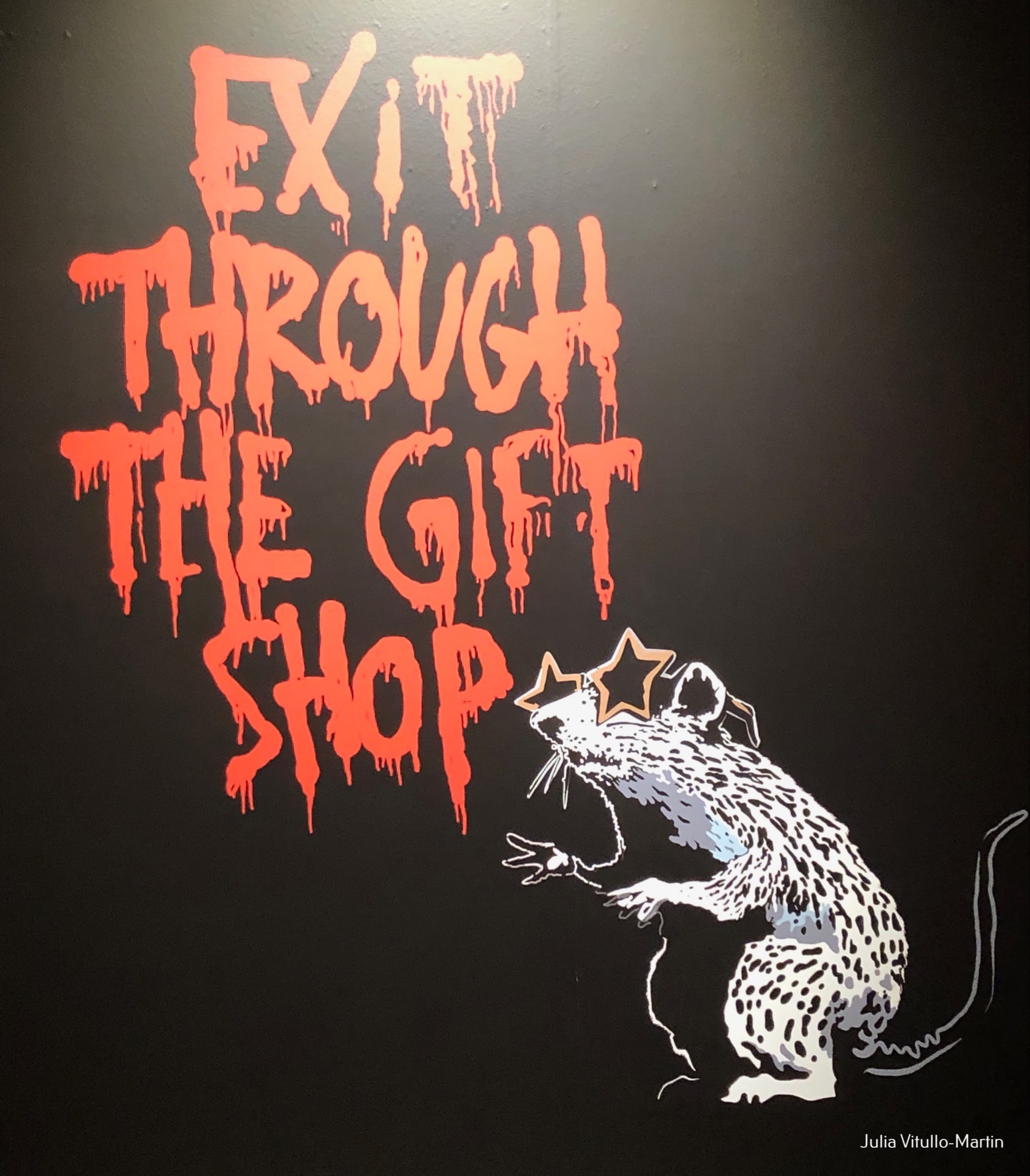
From the 'Genius or Vandal' exhibit on Banksy (photo: Julia Vitullo-Martin)
Like many of Banksy’s drawings, Fever’s “Banksy: Genius or Vandal?” is a title that hits its subject square on the head. This exhibit, which is well worth seeing, should hit home with New Yorkers since New York is where the contemporary art-or-vandalism controversy began in the 1960s. (There are those who argue that graffiti dates to the Paleolithic Lascaux cave paintings in southwestern France, but we’ll put that aside.)
Much early subway art-or-vandalism was crude and surly—Mayor John Lindsay, for one, loathed the tagging, and vowed to wipe it off the face of the IRT. But tagging soon evolved to a much higher level. In the 1970s African-American and Latino writers and artists, many from the Bronx and Northern Manhattan, began covering subway cars with elaborate paintings, made possible by the widely available aerosol can. Meant to be viewed in motion, the painted cars roared through stations, astonishing and often infuriating commuters. What many commentators regard as subway art seriously took off during New York’s fiscal crisis. The MTA yards were virtually unpatrolled, and crews of writers painted freely, producing the peak of what historian Martha Cooper called “outlaw art.”
Banksy’s Local Sojourn
Thought to have been born in 1974 in Bristol, England, Banksy has clearly held New York in a special place in his heart. He entitled his month-long 2013 “residency” in New York “Better Out Than In,” re-asserting his preferred outsider status while simultaneously intimating his privileged education. The title is after Paul Cézanne’s decree that “all pictures painted inside, in the studio, will never be as good as those done outside.”
Banksy announced that he would create one new piece on New York streets each day in October, including “elaborate graffiti, large scale street sculpture, video installations, and substandard performance art.” He told the Village Voice that his plan was “to live here, react to things, see the sights—and paint on them. Some of it will be pretty elaborate, and some will just be a scrawl on a toilet wall.”
Why New York? He wrote, “New York calls to graffiti writers like a dirty old lighthouse. We all want to prove ourselves here. I chose it for the high foot traffic and the amount of hiding places. Maybe I should be somewhere more relevant, like Beijing or Moscow, but the pizza isn’t as good.”
What to Make of Banksy’s Art
Despite his thousands of artworks through the decades, Banksy has managed to keep his identity unconfirmed. He is clearly a man of the left, concerned about issues of equity and justice, immigration, pollution, war, authoritarianism, defiance, and popular culture. His work can be brilliant, even electrifying, and also deeply offensive.
The exhibit does a good job of displaying the full range of Banksy’s approach in what it calls an “unprecedented immersion” that includes a VR session that’s compelling but a little unnerving. You sit still as his handiworks meander and lurch around you in 360 degrees.
Using his website and Instagram, he has distanced himself from the Fever exhibit, posting: “You know it’s got nothing to do with me, right? I don’t charge people to see my art unless there’s a fairground wheel.”
Of the 80+ works in Genius or Vandal, some have been borrowed from international private collections and have seldom been seen publicly before now. Others, such as Banksy’s etchings on the Bethlehem Wall and his “Walled-Off Hotel” across the street, have been photographed and slightly enlarged for display. Arranged in a large, dark room of their own, the Palestinian photographs draw diverse visitors.
His work in New York has mainly been appealing, even conciliatory—no Virgin Marys labeled “toxic” or dying princesses in Cinderella carriages. On the shuttered door of Larry Flynt’s Hustler Club on West 51st Street, he painted a dapper man in a dinner jacket holding flowers (now removed). Nothing vulgar.
One of Banksy’s more endearing New York pieces is “Boy with a hammer” on West 79th Street, across from Zabar’s, which has helped preserve it and protect it from vandalism. Mostly “Boy” maintains a solitary presence but also attracts visitors to pose beneath the hammer, head on the hydrant.
But Then There’s Banksy’s Speech
There’s Banksy’s art, which is one thing, and then there’s his speech, which tends to be without nuance. He enraged many New York fans in 2013 when he wrote on his website about One World Trade Center that “The biggest eyesore in New York isn’t the graffiti, it’s under construction at ground zero. That building is a disaster. Well no, disasters are interesting. One World Trade Center is a non-event. It’s vanilla. It looks like something they would build in Canada.”
Having insulted our neighbor to the north he had worse to say: “You currently have under construction a one thousand foot tall sign that reads, ‘New York – we lost our nerve.’ One World Trade Center declares the glory days of New York are gone.”
Many progressives found themselves defending 1WTC, which few actually loved. Others were simply dumb-founded. Journalist Errol Louis wrote, “New York is a city long accustomed to attention-seeking huckster-artists who push–and exceed–the limits of decency and good taste. But even in a town that gave the world Warhol, Madonna, Diddy and Lady Gaga, the Banksy screed against the World Trade Center site was a bit much to bear.”
Genius or Vandal, which will let you decide for yourself what you think, takes roughly two hours to explore. Adult tickets are $34.50. Limited availability. Location: 526 6th Avenue (SE corner of 14th Street at 6th Ave)
***
Julia Vitullo-Martin is a long-time editor and writer on cities. On Twitter @JuliaManhattan
***
Have an op-ed idea or submission for Gotham Gazette? Email This email address is being protected from spambots. You need JavaScript enabled to view it.